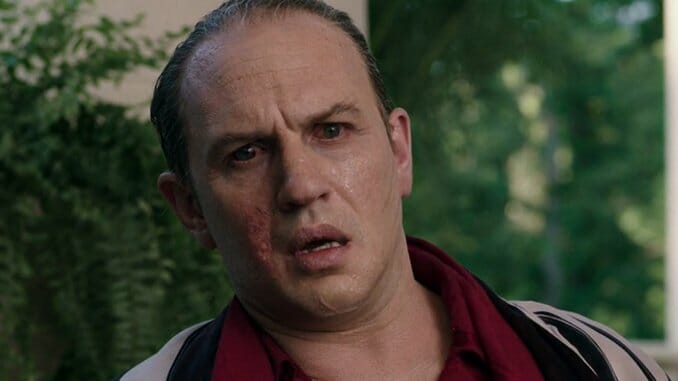Josh Trank’s Capone Is a Full Diaper of Cinematic Dreams

In 1946, in the “final year of his life,” shambling monster Alphonse Capone (Tom Hardy, putrid) hobbles after a group of squealing children, his face a mottled testament to the syphilis also destroying his brain, his voice a cartoonish, sputum-y whine somewhere between “heartburn burp” and “full diaper getting stepped on.” The scene, the opening of Josh Trank’s Capone, is meant to be misleading, our fear for these innocent children transformed into affection once we realize that Capone (“Fonzo” to his friends) is just playing, chasing them around his vast Floridian mansion until they collapse into a doggy pile of giggles.
Fonzo’s wife Mae (Linda Cardellini) has welcomed family and friends and various mooks to celebrate Thanksgiving with the notorious crime boss. We meet Fonzo following a decade-long stint behind bars (released due to his medical condition), in the twilight of his life at only 47 and a mumbling, corpse-like specter of the once-feared mobster. A sopping-wet stogie forever etched into the crook of his dribbling jaw, Hardy as Capone is an unceasingly mounting spectacle of misery and idiotic violence and astounding fecal foley work. To drag us through so much shit—so much shit—Trank must want us to feel something for the guy. There can’t be any other reason why.
Humanizing the monster proves no small feat for Trank; we’re invited to wallow for the length of his feature in Fonzo’s slow physical dissolution. Hallucinations blend into reality as the FBI maintains full surveillance on the Capone estate, but why does Fonzo seem to be the only person who can see the man with the binoculars in the bushes? Even though the man is actually there? And the man who said he didn’t see the man with binoculars actually isn’t there? Or was he there in one scene and a figment of Fonzo’s deteriorating imagination in another? Meanwhile, Mae attempts to sell much of their assets to pay off all the money they owe the IRS—the movie using the extravagant and garish statues that litter their vast lawn to symbolize Fonzo’s pointless wealth, or something—and upstart FBI Agent Crawford (Jack Lowden) can’t shake the hunch that Al Capone may be faking this whole “rotting brain” thing until he does shake that hunch when the film drops him altogether, like one of many turds into Al Capone’s diaper.
Countless characters surface with seeming purpose to the plot but are quickly dispatched after a scene or two, their stories—whatever they were—gone completely unfinished. Capone’s doctor (Kyle MacLachlan) can’t weasel his way out of acting as an FBI informant, until he apparently does, off-screen. An old mob associate, Johnny (Matt Dillon), stops by to go fishing with Fonzo—to witness Capone use a shotgun to blow a very unconvincing animatronic alligator’s brains out—until he’s dumped from the movie with a twist you won’t see coming because the filmmaking logic that governs Capone’s dreamstate is so haphazardly executed, the whole enterprise so paceless, that Johnny’s presence becomes entirely meaningless. Same goes for Junior (Noel Fisher), Capone’s son, who shows up to express concern for his mother, share a cigarette, then fall completely out of the film’s universe. Same goes for Agent Crawford, whose investigation into Capone’s dubious mental acuity ends when, during a meeting, Capone shits his pants so loudly, makes such an incredibly stinky poop, that the Agent can’t help but give up. The look on Tom Hardy’s face, his pate glistening and his skin melting, after he’s emptied himself in front of three grown men is heartbreaking. It’s the funniest scene of the year.